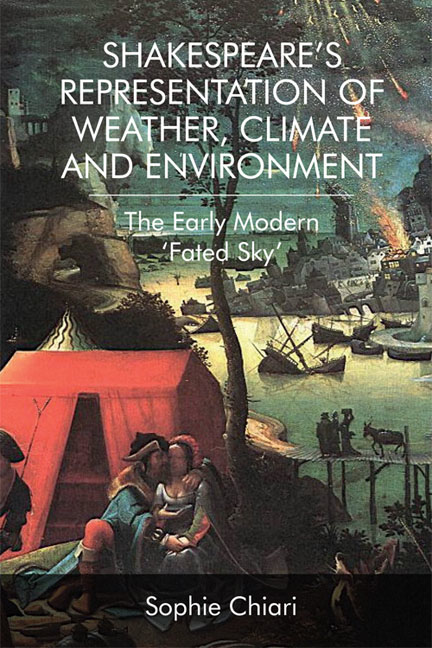Book contents
- Frontmatter
- Contents
- Illustrations
- Acknowledgements
- Textual Note
- Introduction
- 1 ‘We see / The seasons alter’: Climate Change in A Midsummer Night's Dream
- 2 ‘[T]he fire is grown too hot!’: Romeo and Juliet and the Dog Days
- 3 ‘Winter and rough weather’: Arden's Sterile Climate
- 4 Othello: Shakespeare's À bout de souffle
- 5 ‘The pelting of [a] pitiless storm’: Thunder and Lightning in King Lear
- 6 Clime and Slime in Anthony and Cleopatra
- 7 The I/Eye of the Storm: Prospero's Tempest
- Conclusion: ‘Under heaven's eye’
- Bibliography
- Index
1 - ‘We see / The seasons alter’: Climate Change in A Midsummer Night's Dream
- Frontmatter
- Contents
- Illustrations
- Acknowledgements
- Textual Note
- Introduction
- 1 ‘We see / The seasons alter’: Climate Change in A Midsummer Night's Dream
- 2 ‘[T]he fire is grown too hot!’: Romeo and Juliet and the Dog Days
- 3 ‘Winter and rough weather’: Arden's Sterile Climate
- 4 Othello: Shakespeare's À bout de souffle
- 5 ‘The pelting of [a] pitiless storm’: Thunder and Lightning in King Lear
- 6 Clime and Slime in Anthony and Cleopatra
- 7 The I/Eye of the Storm: Prospero's Tempest
- Conclusion: ‘Under heaven's eye’
- Bibliography
- Index
Summary
[…] the winds, piping to us in vain,
As in revenge, have sucked up from the sea
Contagious fogs which, falling in the land
Have every pelting river made so proud
That they have overborne their continents. (2.1.81–5)
A Midsummer Night's Dream takes its title from a famous seasonal celebration of Celtic origin linked to the advent of summer in the British Isles. At the time when the play was presented at the Theatre and, presumably, also at court, the Elizabethan year was divided into two halves, namely winter, from Christmas to 24 June, and summer, which went from 25 June to Christmas. In this early modern calendar, 24 June corresponds to Midsummer, a day likely to prove ‘very hott’, as well as to the latest possible date for Corpus Christi. Poised as it is between the sacred (corresponding to the winter half of the calendar) and the profane (the summer half marked by rural celebrations), Shakespeare's comedy appears as a threshold play, whose delicate balance is exemplified by its double timescape and double setting.
The play's double timescape entails the alternation of day and night while its intriguing double setting takes us back and forth between the comedy's main locale, Athens, under the rule of Duke Theseus, and the forest's green and damp atmosphere under the rule of Oberon and Titania. The wood near Athens actually recalls a folk England whose chilliness is also repeatedly evoked in As You Like It (‘Blow, blow, thou winter wind’, 2.7.174). While southernmost Greece was hot and dry, the English climate was fairly cold and rainy, so that it seems that Shakespeare fashioned his personal geography and exotic settings with his immediate surroundings in mind. In his plays, ‘the far becomes the near’ and it sometimes ‘becomes so dangerously near that it invariably proves necessary to recreate familiar distances to separate the far-off world from the world of Christian civilisation’.
The role of the moon
As noted by Philippa Berry, a tragedy such as Romeo and Juliet is obsessed with ‘the sun's passage in late July’, while A Midsummer Night's Dream, by contrast, is mainly concerned with the shining of the moon.
- Type
- Chapter
- Information
- Shakespeare's Representation of Weather, Climate and EnvironmentThe Early Modern ‘Fated Sky’, pp. 31 - 56Publisher: Edinburgh University PressPrint publication year: 2017



